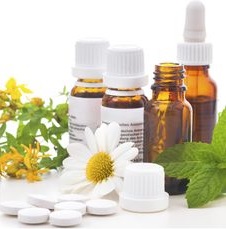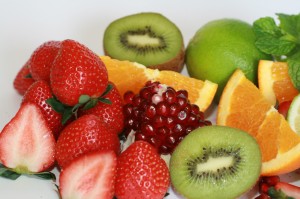 There’s no doubt that skin needs antioxidants. But with so many available, the question is which ones. We’ve got the answer.
There’s no doubt that skin needs antioxidants. But with so many available, the question is which ones. We’ve got the answer.
Like sex educators, dermatologists constantly lecture on the importance of using protection. And we’re not just talking about SPF but also about topical antioxidants that save cells from a significant amount of environmental damage.
WHAT ARE ANTIOXIDANTS?
Antioxidants are substances that the body uses to help protect itself against free radicals (oxygen molecules that break down collagen, which causes wrinkles & sagging skin). Free radicals are molecules which lack an electron, and are produced naturally by the body as it burns oxygen. Cigarette smoke, UV radiation, air pollution, stress, certain medications, and poor diet also produce free radicals. These unstable molecules attack healthy cells and steal their electron, in turn creating another free radical. If free radicals multiply faster than the body’s natural immunity can fight them off, damage to cells and tissues will result. Evidence has shown free radical damage to be the basis of all skin deterioration, and the primary cause of wrinkles and all other visible signs of aging.
HOW DO ANTIOXIDANTS WORK?
Antioxidants protect the skin by neutralizing free radical damage. Antioxidants give up their electrons to free radicals, so that the free radical molecules no longer try and “steal” them from our healthy cells. This means that cells suffer less damage, and for skin that means a less aged appearance. Skin will still age naturally over time, but antioxidants help to prevent accelerated aging, particularly from sun damage, smoking and pollution.
Research is now showing that antioxidants applied directly to the skin can help to protect it and slow down skin aging.
WHICH ARE THE MOST EFFECTIVE ANTIOXIDANTS KNOWN TODAY USED IN SKIN CARE PRODUCTS?
With a dizzying number of antioxidants being packed into more creams and serums than ever, choosing the right one can be perplexing. We’ve gathered the latest wisdom on the top five antioxidants to help you find the best protection. It sure beats abstinence.
GREEN TEA
Green tea has bragging rights to two top features: It absorbs into the skin really well, and of all the antioxidants, it is the most studied. Unlike white and black teas, which are fermented, green tea is made from the steaming and drying of fresh leaves, better preserving its antioxidant polyphenols. Its scores are impressive: It’s over 100 times more effective than vitamin C and 25 times more powerful than vitamin E at neutralizing free radicals. Studies also show that it protects against DNA damage caused by the sun. To be effective, the serum or cream needs to have a high concentrated polyphenols, and you can tell when one does because the product will be tan to brown.
 VITAMIN C
VITAMIN C
This vitamin stands out for one compelling reason: Increasing levels of vitamin C in the skin can prevent and, unlike most antioxidants, even repair some signs of aging. That’s because it plays a vital role in the metabolism of collagen. The problem, however, is that topical vitamin C can be unstable, meaning that when it’s exposed to oxygen, sunlight, or certain liquids, it breaks down and becomes ineffective. The best formulas use ascorbic acid, the most stable form of C, and are often serums packaged in brown, airtight containers or single-use ampoules.
Unlike more complex antioxidants, which are naturally made up of a mixture of antioxidants, vitamin C or E alone can actually produce free radicals. They need to be in the presence of a similar antioxidant to counteract this effect. That’s why you often see vitamin C with vitamin E. And, appealing on the instant-gratification front, when you slick on a vitamin C product, your skin may tingle. That’s a very good sign that the vitamin C has a low enough PH to be effective. If the cream turns brown or if it’s been opened for more than three months, it will no longer be effective.
Some of EILEEN MAI®products that you can try are: Vitamin C Serum, Vitamin C Night crème, Vitamin C Moisturizer SPF 30, Vitamin C Hand & Body Cream và Vitamin C – Peptides Eye Gel.
IDEBENONE
Idebenone is one tough cookie. Unlike most antioxidants, which can only cancel out one free radical per molecule, idebenone is able to negate multiple free radicals or stop them from forming in the first place—which means your skin stays protected longer. One caveat: Because idebenone is so strong, it can cause skin irritation in some people. So make sure to test on a small area in your inner arm or your ear before applying it on your face.
 POMEGRANATE
POMEGRANATE
It’s more than just Persephone’s fruit. Pomegranate’s extremely high polyphenol content strengthens the cell membrane, making it less susceptible to damage and moisture loss. Translation: Skin remains hydrated throughout the day and is less likely to wrinkle prematurely in the long run. Pomegranate may also help protect against skin cancer.
COFFEEBERRY
Hailed as the most potent mixture of natural antioxidants discovered to date, CoffeeBerry—the extract of the cherries of the coffee plant, is able to neutralize a wide variety of free radicals so well because of the tough conditions the plant tolerates outdoors. As with vitamin C, CoffeeBerry can also reverse some signs of UV damage. Dermatologists believe CoffeeBerry may also help with pigmentation problems, such as dark and red spots and rosacea.
Besides those listed above, Vitamins A (Retinyl Palmitate), C (Ascorbic Acid) and E (Tocopherol or Tocopheryl Acetate) are also the most popular antioxidants in skincare. There are also some natural ingredients which are rich in antioxidants. Some of these include green tea, rose hip oil, sweet almond oil, avocado oil and grape seed extract. Also the minerals selenium and zinc.
Antioxidants are also added to cosmetics to inhibit reactions promoted by oxygen, preventing rancidity and oxidization. Commonly used ingredients for this are: Ascorbic Acid (Vitamin C), Butylated hydroxyanisole (BHA) Butylated hydroxytoluene (BHT) and Tocopheryl (Vitamin E).





